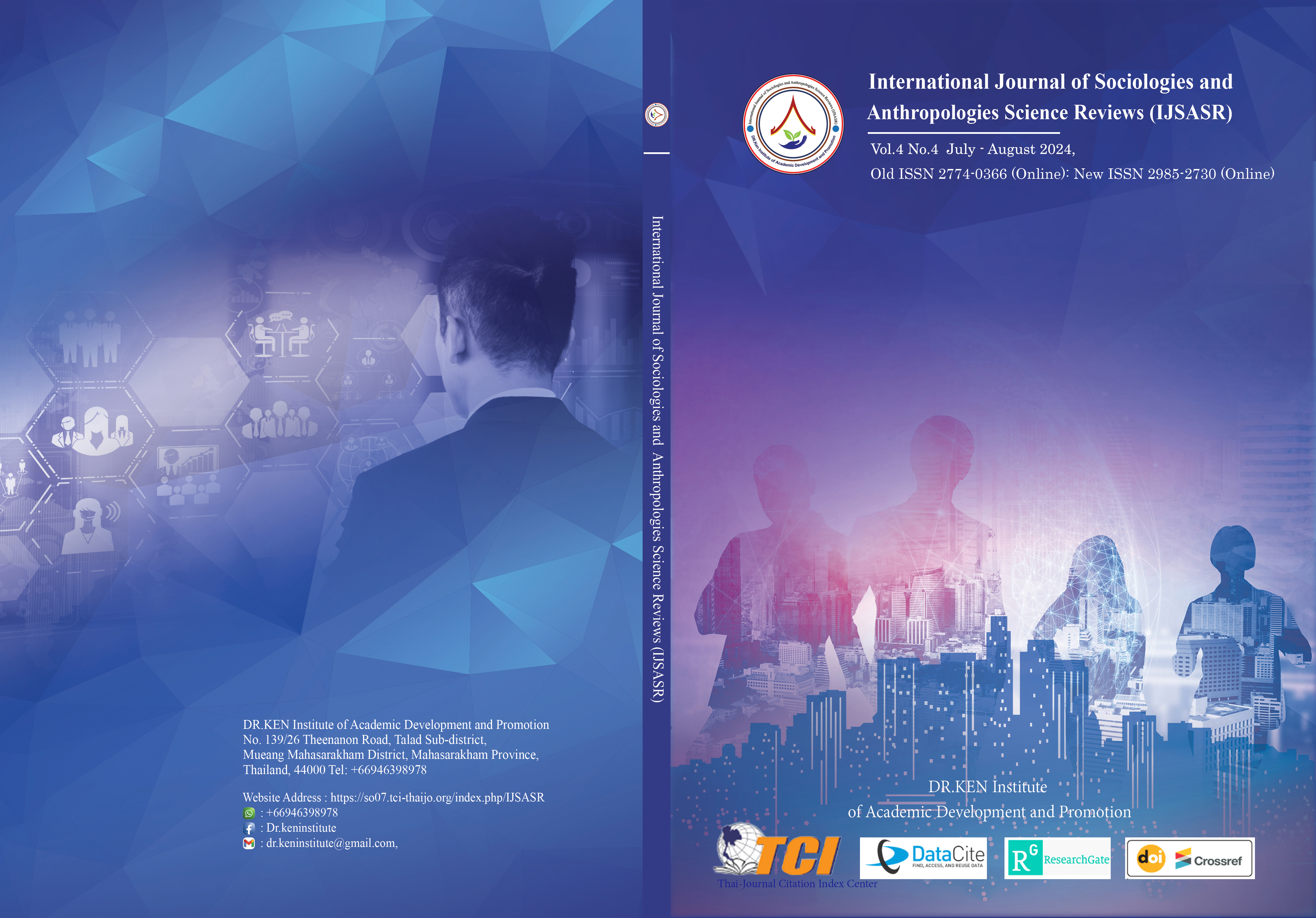A Program Evaluation for Tourism Management by Using Tyler's Objective-Oriented Model in Guangxi, China
Main Article Content
Abstract
Background and Aim: Given the critical role of teaching quality in shaping future tourism management professionals, this research aims to survey the current status of undergraduate teaching quality, and to explore the application of Tyler's educational theory in Tourism Management major.
Materials and Methods: The evaluation involved 201 sophomore undergraduate students of GL University majoring in tourism management. Data were collected from the consultation questionnaire based on the Tyler model. In the evaluation, teaching environment, course construction, teaching organization, implementation effectiveness, and teaching support served as independent variables, and "overall satisfaction with teaching quality" served as the dependent variable.
Results: The mean values of the five independent variables were in the range of 3.0-4.0, meaning that all aspects need to be further improved. With the logistics regression model, the adjusted R square (coefficient of determination) = 0.548, indicated that there was a high research representativeness of the five independent variables developed from Tyler's educational theory. Taylor's educational theory significantly explains the differences in students' satisfaction with teaching quality.
Conclusion: Based on the results, some teaching strategies and methods were proposed, which included making efficient use of teaching resources; promoting reform of teaching contents and methods, and standardizing the management system. The results suggest strengthening teaching resources, curriculum reform, and management practice, which is expected to improve the quality of tourism management education.
Article Details

This work is licensed under a Creative Commons Attribution-NonCommercial-NoDerivatives 4.0 International License.
Copyright on any article in the International Journal of Sociologies and Anthropologies Science Reviews is retained by the author(s) under the under the Creative Commons Attribution-NonCommercial-NoDerivatives 4.0 International License. Permission to use text, content, images, etc. of publication. Any user to read, download, copy, distribute, print, search, or link to the full texts of articles, crawl them for indexing, pass them as data to software, or use them for any other lawful purpose. But do not use it for commercial use or with the intent to benefit any business.

References
Anh, V.T.K. (2018). Evaluation Models in Educational Program: Strengths and Weaknesses. VNU Journal of Foreign Studies, 34(2),140-150.
Che, Y. Z. (2020). The Current Situation and Problems of Practical Teaching Mode of the Tourism Management Major in Application-oriented Universities. The Science Education Article Collects, 505(25), 117-118
Collie, R. J. (2022). Instructional support, perceived social-emotional competence, and students’ behavioral and emotional well-being outcomes. Educational Psychology, 42(1), 4-22.
Donlon, E., Conroy Johnson, M., Doyle, A., McDonald, E., & Sexton, P.J. (2022). Presence accounted for? student-teachers establishing and experiencing presence in synchronous online teaching environments. Irish Educational Studies, 41(1), 41-49.
Guo, A.L., & Nie, X.R. (2022). Research on the Course Construction of Analytic Geometry Based on the Applied Talent Training Mode. Education and Teaching Forum, 12.
Hu, W., & Yuan, H.Z. (2022). Application of Information Technology in Teaching Quality Evaluation. Electronic Technology, 51(7), 120-124.
Huang, H. Y. (2022). Observation and analysis of teachers' organizational ability in classroom teaching based on data. Educational Communication and Technology.
Jiang, Z. Y. (2022). Class selection: The Innovation of Teaching Organization and Management. Jiangsu Education, 27(2),1-10.
Leng, B.Y. (2001). Investigation of Student-Centered Undergraduate Teaching Quality Satisfaction. Heilongjiang Science, 12(21), 1-10.
Li, S., Liu, Z. J., & Zheng, Q. H. (2022). Research on Data-driven Online Teaching Quality Evaluation in the Intelligent Era. e-Education Research, 352(8), 1-18.
Li, Z. (2022). Research on the practical path of promoting the Construction of Labor Curriculum in Colleges and Universities. Henan Education (Higher Education), 3, 1-10.
Madaus, G.F., Stufflebeam, D., & Scriven, M.S. (1983). Program Evaluation. In G. F. Madaus, M. S. Scriven, & D. L. Stufflebeam (Eds.), Evaluation Models: Viewpoints on Educational and Human Services Evaluation (pp. 3-22). Springer Netherlands.
Mutch-Jones, K., Boulden, D.C., Gasca, S., Lord, T., Wiebe, E., & Reichsman, F. (2021). Co-teaching with an immersive digital game: supporting teacher-game instructional partnerships. Educational Technology Research and Development, 69(3), 1453-1475.
Qi, Z.Y., & Du, T. (2022). What is a Good Evaluation of the Effect of Education Policy? JOURNAL OF EAST CHINA NORMAL UNIVERSITY (Educational Sciences), 40(2).
Qian, X.Q. (2022). Exploration of Grass-roots Teaching Organization in third Party Colleges and Universities: A case study of Ningbo University School of Physics Science and Technology. Journal of Taiyuan City Vocational and Technical College, 1, 68-71.
Taofeeq, B., Gana, C.S., Gimba, R.W., & Salako, K.A. (2022). Implementation of Physics Curriculum in Senior Secondary School Using Tyler`S Objective Model in North- -Central States, Nigeria. Journal of Economic, Social and Educational Issues, 2(2), 1-10.
Taylor, L., Dyer, T., Al-Azzawi, M., Smith, C., Nzeako, O., & Shah, Z. (2022). Extended reality anatomy undergraduate teaching: A literature review on an alternative method of learning. Annals of Anatomy - Anatomischer Anzeiger, 239, 151817.
Tyler, R. (1949). Basic principles of curriculum and instruction. University of Chicago Press.
Wang, J. (2005). The Analysis of Ralph Tyler Classic Curriculum Paradigm. Journal of Heilongjiang College of Education, 24(5), 1-8.
Wu, Q., & Feng, J.X. (2022). A Case Study of Curriculum Reform of Tourism Management Specialty in Local Colleges and Universities Based on Ability Training. Application-Oriented Higher Education Research, 7(1), 1-6.
Wu, T.X., & Chen, X. (2022). Analysis of employment-oriented higher Vocational Education teaching quality evaluation Standard. China Journal of Multimedia & Network Teaching.
Xiang, M., & Deng, M. (2023). Upgrading and transformation of hotel management undergraduate talent training mode under the digital background -- A case study of GL University. JOURNAL OF GUILIN UNIVERSITY OF AEROSPACE TECHNOLOGY, 109(1), 7,1-12.
Yang, P., & Du, Z. H. (2021). On "MOOC +" law undergraduate teaching model in the post-epidemic period. Legal Education Research, 32(1),1-6.






